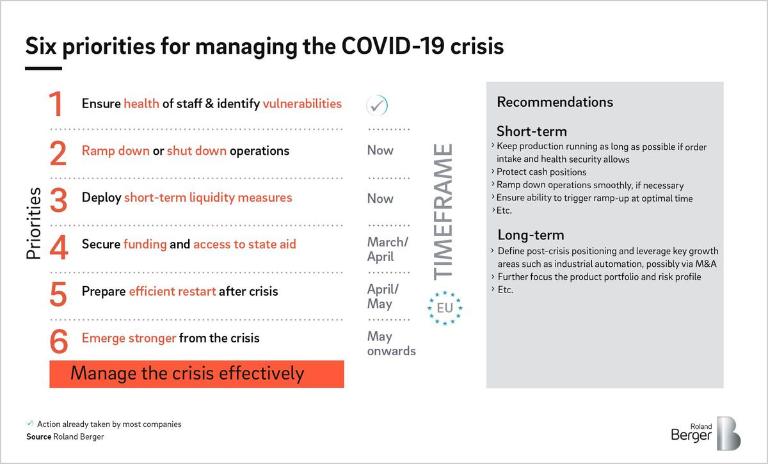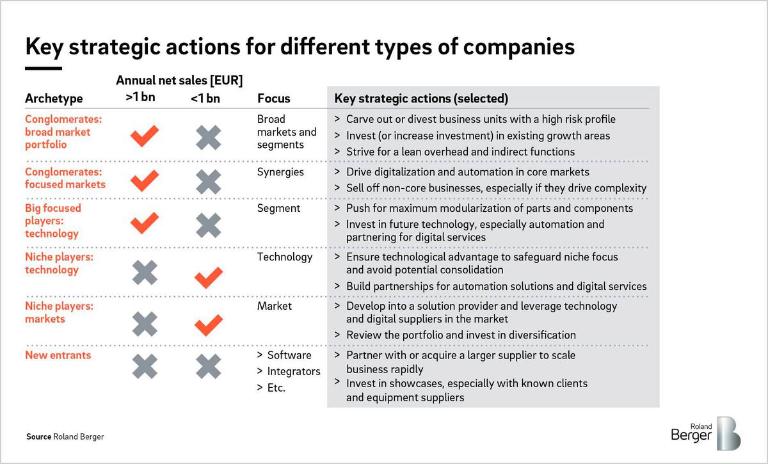The coronavirus crisis will pass, while the challenges that mechanical and plant engineering companies have faced in recent years will continue.



The Covid-19 crisis presents mechanical and plant engineering companies with unprecedented challenges, from shortages in the supply chain and temporary halts in production to the postponement or even cancellation of capital investments. This comes on top of the ongoing downturn in the industry that began in 2018. Players need to act swiftly to mitigate the risks. But they must also develop strategies for their long-term positioning so that they can emerge from the turmoil stronger and fitter for the future.
The mechanical and plant engineering industry has been in the throes of a decline since 2018. The deterioration in the industry's financial performance forecast for 2018 and 2019 has been confirmed and will no doubt continue, driven by less growth in China than expected (due to the ongoing trade war and weak domestic markets), continuing sanctions on Russia and Iran, and the negative impact of Brexit. Now, on top of all of this, the industry is facing one of the greatest challenges it has ever seen in the shape of the Covid-19 crisis, bringing in its wake production stops, shortages in the supply chain and the inevitable postponement or cancellation of capital investments.
The VDMA (Mechanical Engineering Industry Association) is forecasting a five-percent drop in production in 2020. Our own observations, based on a survey of more than 300 international industry insiders carried out in Q4 2019, indicate key challenges in the area of cost structures, business models and performance culture in the short, medium and long term. In a separate study , we examined more than 40 leading industry players in German-speaking countries and found a one percentage point drop in EBIT margin (the ratio of operating income to net sales) since 2017, and a decrease in EBIT margin in almost half of the companies from 2018 to 2019. A quarter of the companies also saw a decline in sales from 2018 to 2019, and many were more highly leveraged and less liquid in 2019 than in 2007, prior to the financial crisis, indicating a real risk of financial distress.
The ultimate impact of the Covid-19 crisis is impossible to estimate at present, although we are closely monitoring its progression . Companies saw a higher order intake in January 2020 than January 2019, but are now expecting a 88 percent drop in orders due to the virus. The crisis impacts both the supply side and the demand side: Today's supply chains are more complex than in the past and rely more strongly on Chinese suppliers in particular, while on the demand side companies are more dependent than ever on key industries such as automotive, will themselves take a beating from the Covid-19 crisis.
Clearly, mechanical and plant engineering companies must act fast. We identify six priorities for firms, each of them areas where Roland Berger can provide effective solutions.
First, businesses must take immediate action to protect the health of their workforce and identify any vulnerabilities within their organizations; most companies have already done this. Second, they should consider adjusting their capacity by ramping down their operations or shutting them down completely; we observe this occurring now. Third, they need to ensure short to mid-term liquidity. The fourth step will be to secure funding and access to government aid packages, which we expect to see happening over the coming days and weeks. The fifth priority is for companies to prepare themselves for an efficient restart when the critical phase of the crisis passes. This will enable them, ultimately, to emerge stronger and better prepared for the future.
The challenge facing companies under these straitened circumstances is two-fold, affecting both their short-term liquidity and their long-term profitability. In the area of liquidity, firms can draw some comfort from the fact that existing projects generally have long lead times, which supports their cash inflows, as does ongoing service business. Cost structures are mainly fixed, but some possibilities exist for adjusting these quickly when orders are cancelled or delayed. In the area of profitability, companies have few options for countering the effect of cancelled projects. This will make their service business increasingly important for supporting their bottom line.
To ensure that they emerge stronger on the other side of the crisis , mechanical and plant engineering companies need to tackle key strategic topics now. This will enable them to restart once the crisis passes with a robust plan of action firmly in place.
Our recommendations for businesses differ depending on the type of company. We identify six company "archetypes" in terms of size, market, segment and technology focus. For example, conglomerates with a broad market portfolio might consider carving out or divesting specific business units with a high risk profile, stepping up investment in current growth areas and ensuring a lean overhead and indirect functions. Niche players with a focus on technology might want to shore up their technological advantage and consider partnerships for automation solutions and digital services. And new entrants – the smallest players on the market – might consider partnering with or acquiring a larger suppler so that they can rapidly scale their business.
Whatever course the current crisis takes, hard times lie ahead for the industry. Surviving in the daily struggle is essential, of course, and a matter of first priority. But companies should make sure that they do not focus on current problems at the expense of preparing for the future. The Covid-19 crisis will pass, while the challenges that the industry has faced in recent years will continue. Planning long term and having a clear target vision for the future will ensure that companies lay the strategic foundations for life after the virus.



